You’ve been applying to jobs for days. Your back is stiff, and your eyes have begun to swell. Every job board seems the same to you, and yet you still go ahead and drop your resume. You feel sad, exhausted, and frustrated. That’s exactly what job search burnout does to you.
Job search burnout is a state of emotional, physical, and mental exhaustion often experienced by individuals who have been actively seeking employment for an extended period. This condition can significantly impact a person’s well-being, motivation, and overall job search efforts. And it’s not just you. According to Insights Global, a 2023 survey found that:
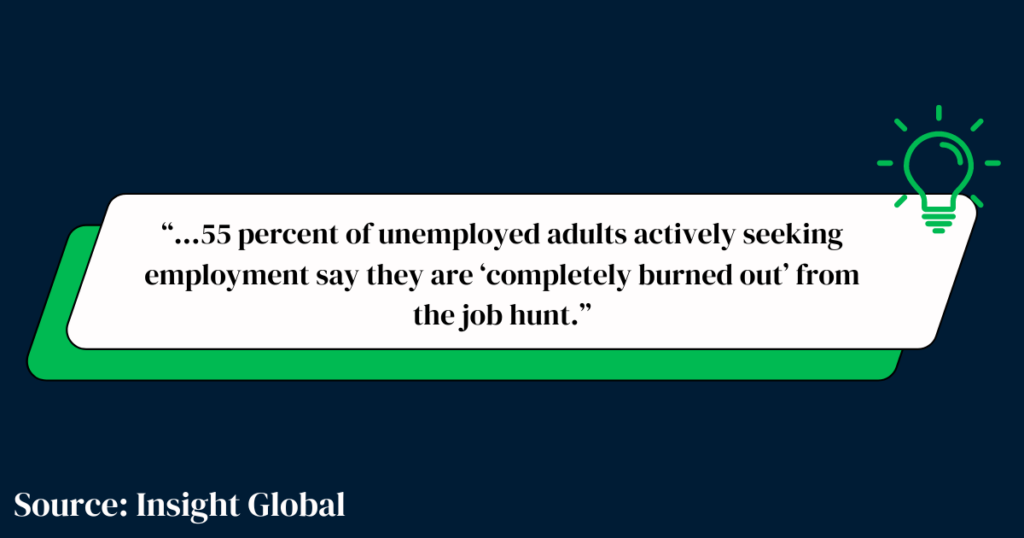
In this blog, we will delve into the signs and symptoms of job search burnout, as well as effective strategies to prevent and overcome it. By understanding and addressing this phenomenon, you can increase your resilience and improve your chances of finding fulfilling employment.
Signs and Symptoms of Job Search Burnout
The diagnosis comes before the cure. So, it is important to know the signs and symptoms of job search burnout. With this information, you can perform a self-diagnosis whenever you feel out of the ordinary.
Physical Symptoms
The burnout is multi-faceted, and so are its effects. One of the most common indicators is the presence of physical symptoms. According to MayoClinic, feeling excessively tired and drained, even after adequate sleep, is a frequent sign. Headaches and migraines may also become more common.
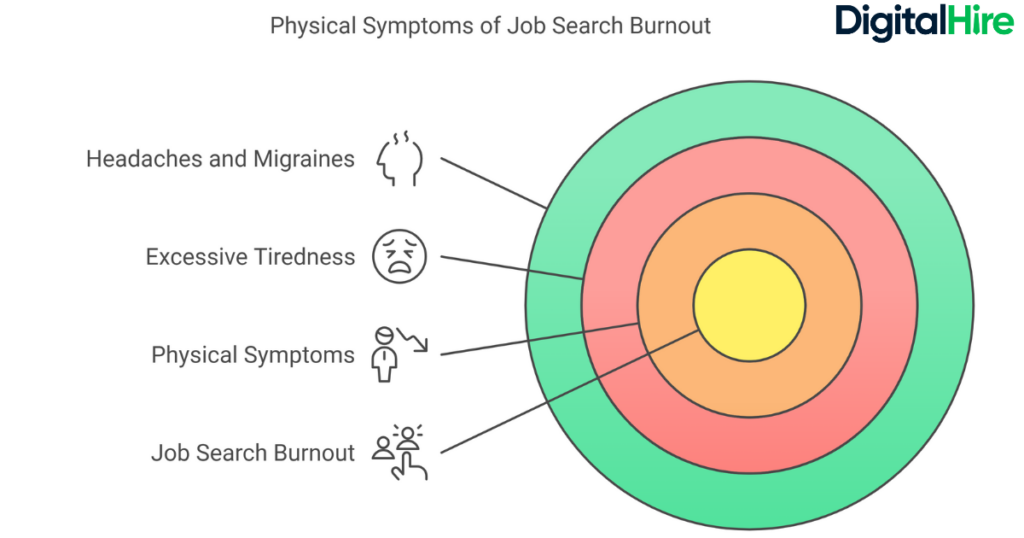
Emotional Symptoms
Emotionally speaking, you might constantly feel anxious, overwhelmed, and worried. Anxiety about prolonged unemployment can be especially troubling. You might feel irritable as a consequence of all this confusion and suffocation, which inevitably may lead to repeated cycles of minor or major frustration. On the other end of the spectrum, you might begin to feel numb by the entire process. You may find yourself losing motivation or energy to continue.
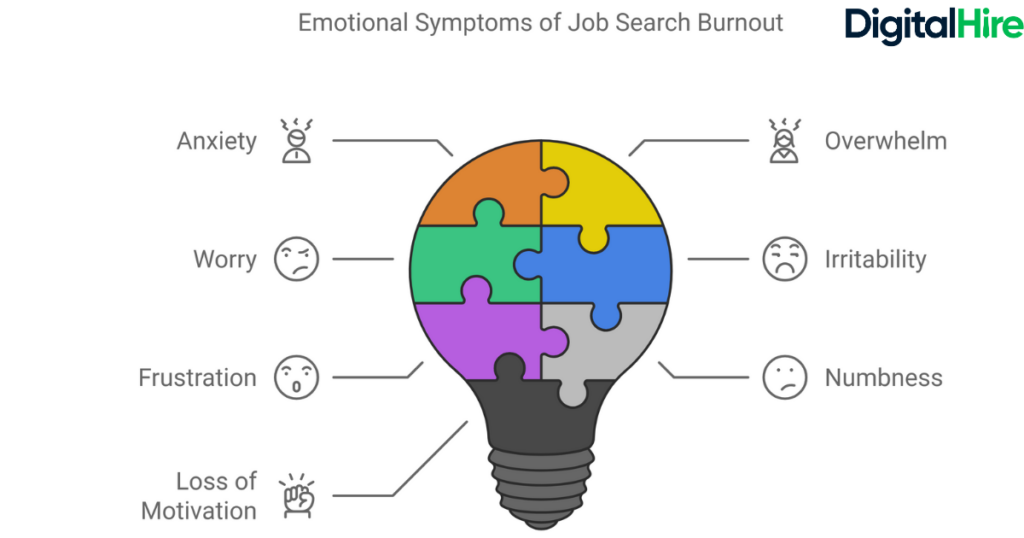
Behavioral Symptoms
We briefly touched upon behavior in the previous section, but there’s more to it than simple cycles of frustration. You might hit lower levels of productivity, finding it difficult to focus, concentrate, or complete tasks. In the midst of all this, procrastination may become prevalent, leading to avoidance of job search activities or applications. Lastly, negative self-talk is also a usual consequence.
Strategies to Prevent Burnout
For those that are already in this condition, don’t worry. We are here for you. We will be discussing the strategies to cope with the burnout in a bit. But before that, let us spend some time thinking about how to prevent it. After all, prevention is better than cure.
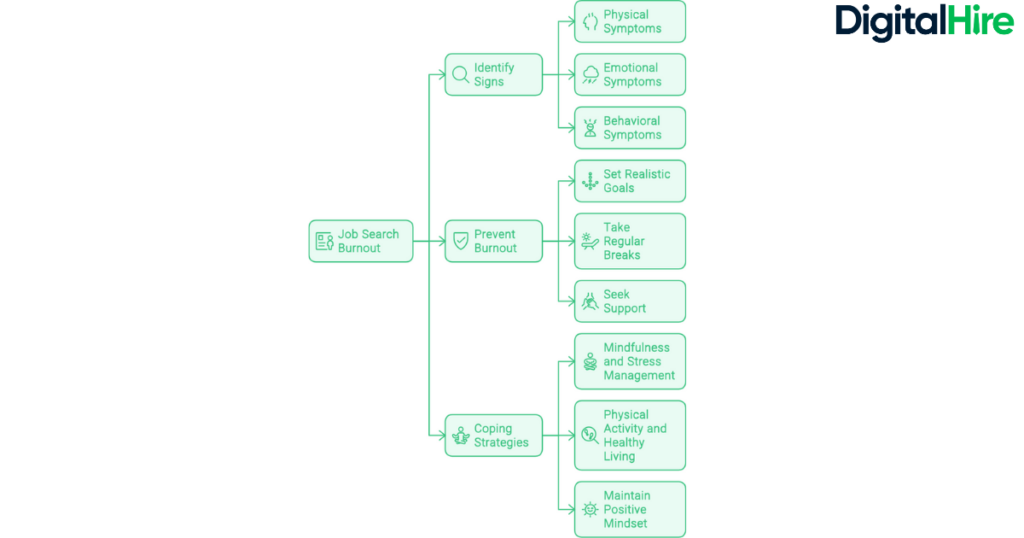
Setting Realistic Goals
One of the most effective ways to prevent job search burnout is to set realistic goals. According to Morgan Law, by breaking down larger, overarching goals into smaller, more manageable steps, you can create a clear roadmap for your job search. This way, you won’t feel too overwhelmed down the road.
To make this more concrete, make your goals specific and actionable. Instead of simply stating, “I want to find a new job,” try a more specific goal like, “I will apply for five jobs per week.” Now you know what needs to be done, how much needs to be done, and when it needs to be done.
On a personal note, try to avoid comparisons. It is a bit cliche, but the fact that everyone has their own journey, destination, and pace is quite true. You are not your neighbor, and your neighbor is not you – even if you are applying for the same job on the same site.
Focusing on your own goals and achievements can help prevent feelings of inadequacy and frustration. Try to celebrate your own successes and your own little milestones. This will keep you motivated, and the entire process won’t feel like a burden.
Regular Self-Assessment
To prevent burning out, you must think methodically. Schedule your day, week, and month in such a way that it is easy to reflect back on your efforts without making it cumbersome.
To accomplish this, you might want to keep a journal by your bedside or a special section in your Notes App. Here, you might note down your daily job searching activities, successes, and challenges.
Also, try to see if there’s any free time that you can make out for yourself. It is necessary to rest and relax every now and then so you can work more efficiently. Meanwhile, you might not want the job application process to stagnate your personal growth. So, work on some other soft and hard skills in the meantime so you might become more legible for better jobs out there.
Building a Support Network
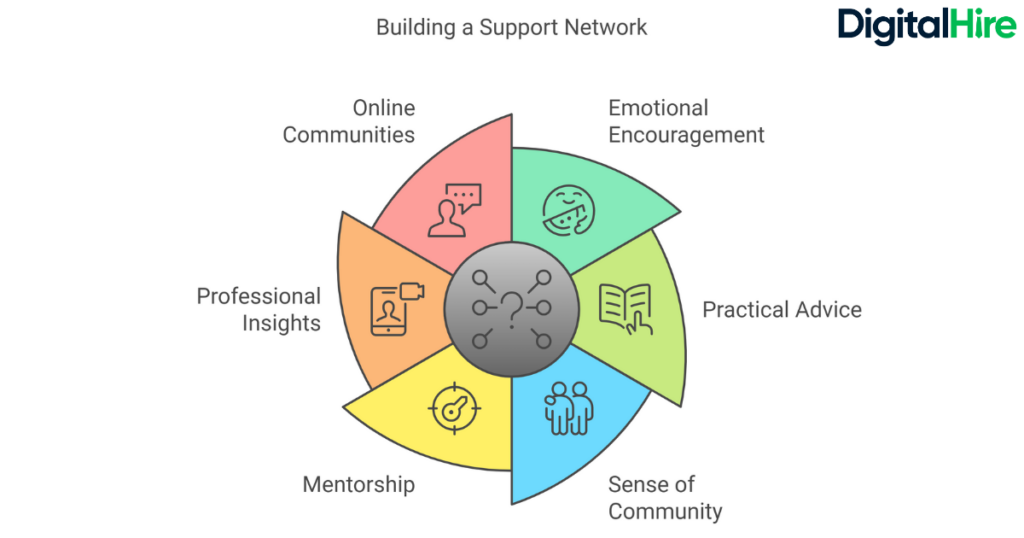
As we talked about self-isolation before, it is highly crucial that you seek support from others. Being alone normally creates your own echo chamber where only your own negative thoughts bounce off each other. There’s no other opinion except yours that can counter it. There’s nothing fresh or new.
Connecting with friends, family, or support groups can provide emotional encouragement. Moreover, they can also offer practical advice and a sense of community. Sharing your experiences with others can also help you feel less alone and reduce feelings of isolation.
At the same time, mentors and professionals in your network can prove substantive in driving you forward. Their personal and professional experiences, matter-of-fact insights, and words of affirmation can be highly enlivening. While online communities can guide well and friends and families can cheer up your spirits, a network of business professionals can accomplish both these goals.
Strategies To Cope With Burnout
We’ve dwelt for quite some time on how to prevent it. But for those of you who are already in this quagmire, let’s discuss two main ways that you can break through this vicious spiral.
Developing a Balanced Routine
When navigating a demanding job search, it is crucial to strike a balance between productivity and well-being. According to an article published by the World Economic Forum, setting up a balanced routine can lead to better cognitive abilities and health. A rather effective and practical way of accomplishing this is dividing your day into specific sections. Here are 4 ways that will help you in doing just that:
Prioritize Tasks: Understand that not all tasks are equal. To maximize output and minimize input, you have to prioritize your activities based on their importance and urgency. Try using tools like the Eisenhower Matrix to
- Categorize tasks into four quadrants: Urgent and Important, Important but Not Urgent, Urgent but Not Important, and Not Urgent and Not Important.
- Create a Schedule: Plan around your day and keep a relatively equal portion for personal and professional needs. Allocate specific blocks for job searching, relaxation, exercise, and other essential activities. Thereafter, be consistent in following it, albeit with a bit of flexibility in accordance with circumstances.
- Limit Job Search Hours: As we discussed before, while it’s important to be diligent, excessive job searching can lead to burnout. Set specific hours for your job search activities and adhere to them.
- Avoid Multitasking: Although this is a bit difficult to do in our fast-paced world, you must remember: we are working smart, not hard. While multitasking may seem efficient, it can actually decrease productivity and increase stress. So, focus on one task at a time to improve your concentration and reduce errors.
Career-Focused Stress Relief
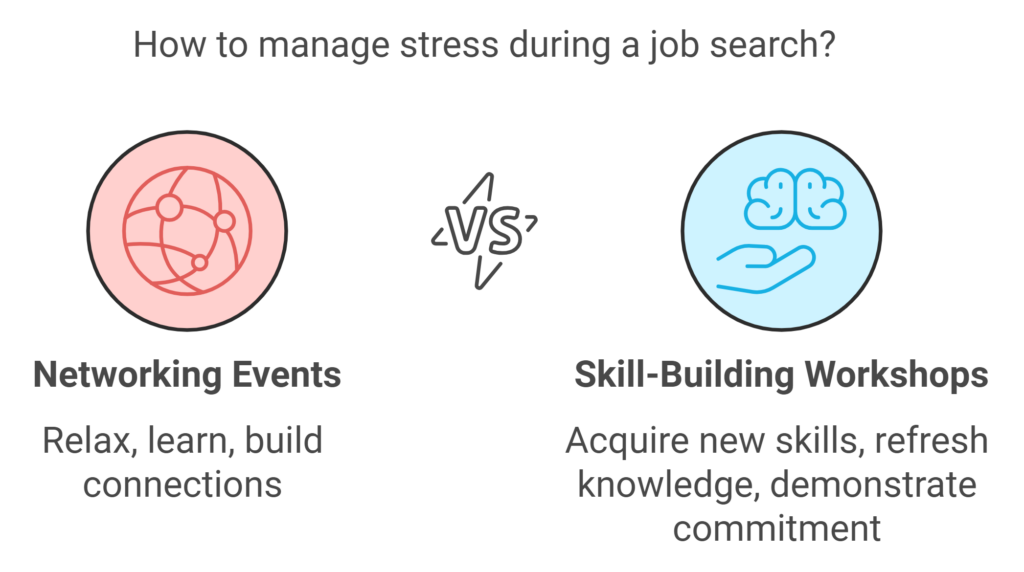
The second way to manage stress is to engage in activities that are career-focused but don’t put immediate pressure on landing a job. In other words, they don’t detract you from your professional duties but don’t carry the same burden.
Firstly, we have networking events. Ideally, these events provide a relaxed atmosphere where you can exchange ideas, learn about new opportunities, and build relationships. You don’t have to pitch yourself or apply. Just learn, interact, and establish genuine connections that can benefit your career in the long run. To know more about networking strategies, check out this blog right now!
Secondly, we have skill-building workshops. As we discussed earlier, you can’t sit idly by if the hiring teams aren’t responding. To make sure they can’t say no, show them skills that will compel them to take you seriously. Thus, by attending workshops on relevant topics, you can acquire new skills, refresh your knowledge, and demonstrate your commitment to professional development. Plus, these workshops can provide a much-needed break from the constant job search.
Lastly, we have mock interviews. In short, it is an emulation of an actual interview. They can be an invaluable tool for managing stress and improving your interview performance. Practicing with a mock interviewer can help you identify areas for improvement, build confidence, and reduce anxiety. Remember, the goal of mock interviews is to prepare you for the real thing, not to stress you out.
Maintaining a Positive Mindset During the Job Search
Before we close, we would like to think about what Shakespeare said about thinking. He said: “Nothing is good or bad, but thinking makes it so.” Hence, while all of the aforementioned advice is crucial, they are useless if you do not simultaneously work on your mindset. The foremost among these things is the art of making rejection feedback constructive, not destructive.
By reframing rejections as learning opportunities, you guide your mind to glean insights, lessons, and positivity from an apparently negative experience. Take the following questions as an example:
Did I lack specific skills or experience?
Was my resume or cover letter not tailored enough to the role?
Would it help if I update my Job Board profile?
By understanding the underlying causes, you can identify areas for improvement and make necessary adjustments.
It’s also important to remember that rejection doesn’t necessarily reflect your worth as a professional. While it may highlight weaknesses in you, it doesn’t define you. In fact, many successful individuals have faced numerous rejections before landing their dream jobs. Consider the stories of individuals like Sarah Blakely, the founder of Spanx, or J.K. Rowling, the author of the Harry Potter series. Both faced countless rejections before achieving their groundbreaking successes. Remember, every no brings you closer to a yes.
Conclusion
It’s important to recognize that you must not give up. Divide your schedule and have long-term plans. Look at the job search more like an exciting adventure than a full-time job. Be consistent, watch for changing market conditions, and prioritize long-term goals.
Lastly, DigitalHire is always here to help job seekers like you put your best foot forward. With our AI-powered Job Board, we align your unique culture and skills with the right employers. We have streamlined the process for you with video resumes and video job postings. So, go ahead and give it a try. Perhaps your next job is just a click away!
Was this blog useful? Subscribe to our job seeker newsletter for more resources!
 Offer
Offer


